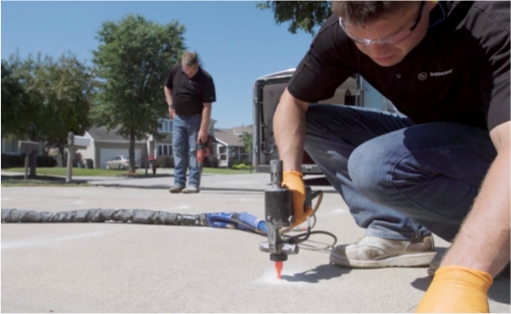We do not recommend attempting to lift or level concrete yourself as most DIY products require specialized equipment and do not result in a long-lasting solution. Don't hesitate to contact us for a free, no-obligation estimate!

Can I lift or level sunken concrete myself?
More FAQs
-
What causes concrete to sink?
Poorly compacted soil: When your home was built, soil movement around the building site results in poor compaction. Even when the replaced soil is compacted well, it's never as stable as the original soil. Over time, this can cause voids to form and slabs to settle.
Dry soil: Another cause of soil failure is drought. During dry conditions or even just during periods of warm weather and low precipitation, the soil under your concrete will dry out and shrink, creating voids. The concrete above eventually cracks and sinks into these empty spaces, especially if any weight is placed on it.
Flooding: When the rains return, the water has an even easier pathway under the slab due to cracks and crevices left over from the dry period. And this wet, soft soil is too weak to support the concrete above it. In the worst case, the soil erodes and washes away completely, leaving behind large voids that cannot support the weight of the concrete above.
-
How much does repairing uneven concrete cost?
Our PolyLevel solution is cost-effective over the long term because it offers a long-lasting solution, unlike mudjacking which can degrade over time. The cost for concrete leveling depends on the project's size and application, so don't hesitate to contact us for a free, no-obligation estimate!
-
What is PolyLevel?
PolyLevel is a two-part urethane polymer that expands into high-density foam to fill voids, lift and stabilize concrete.
-
How much does PolyLevel cost?
PolyLevel is a proprietary product developed by Foundation Supportworks and is available exclusively from LevelUp and other concrete repair contractors in the Foundation Supportworks network. The cost for concrete leveling depends on the project's size and application, so don't hesitate to contact us for a free, no-obligation estimate! PolyLevel is cost-effective because it offers a solution that is long-lasting, unlike mudjacking and slab replacement. And your concrete will never cost less to repair than it does right now.
-
Is PolyLevel safe for the environment?
Yes. PolyLevel does not react with soil or moisture, so it will not leach harmful chemicals into the soil.
-
How soon can I use my driveway/sidewalk/patio/pool deck?
PolyLevel cures very quickly. In fact, you can drive your car over a driveway slab just 15 minutes after it's been lifted with PolyLevel.
-
What is mudjacking or slabjacking?
Mudjacking (or slabjacking) is the process of lifting a concrete slab using a cement slurry, which is usually a mix of sand, water, and cement. Compared to PolyLevel, mudjacking is signficantly heavier, messier, and more time consuming.
-
Is PolyLevel better than mudjacking?
PolyLevel offers many advantages over traditional concrete leveling methods like mudjacking. PolyLevel is significantly lighter at only 2 lbs. per cubic foot compared to 100 lbs. for cement slurry, which means a much more efficient installation process. PolyLevel is less invasive, only requiring holes that are smaller than the size of a dime to be drilled. PolyLevel won't wash away or erode over time, and best of all—it's cured and ready for traffic after just 15 minutes.
-
How long does PolyLevel last?
PolyLevel does not react with soil or moisture so it won't erode away over time, effectively making it a permanent solution for filling voids and lifting settled concrete.
-
Does PolyLevel require maintenance?
No. Once it's cured, your driveway/patio/sidewalk/pool deck are ready to use and don't require re-application of PolyLevel unless the underlying soil degrades further.
-
Do you fix basement or retaining walls?
No. We focus on lifting and leveling slab foundation floors.